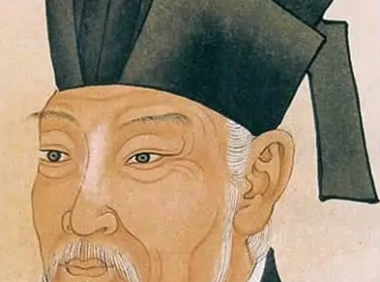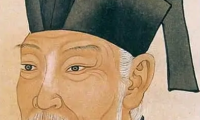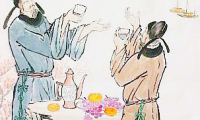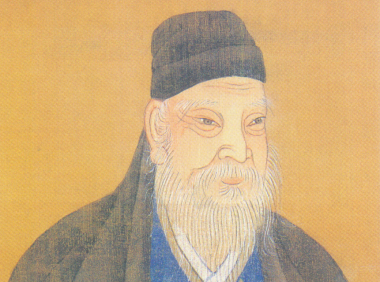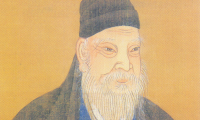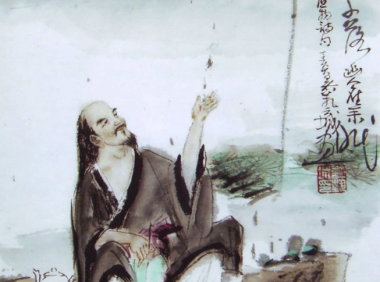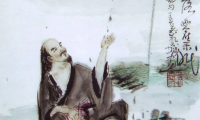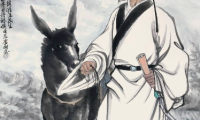-
白居易《与梦得沽酒闲饮且约后期》- Poems of Bai Juyi | Chinese poet
Bai Juyi 与梦得沽酒[1]闲饮且约后期[2] 少时犹不忧生计, 老后谁能惜酒钱? 共把十千[3]沽一斗, 相看七十欠三年。 闲征雅令穷经史, 醉听清吟胜管弦。 更待菊黄[4]家酿熟, 共君一醉一陶然[5]。 此时,白居易和刘禹锡(梦得)同在洛阳,白居易任太子少傅,是个闲职。二人饮酒闲谈,回首平生,难免有“早岁那知世事艰”的感慨。两人争着付钱买酒,相看都已67岁,虽有高雅情怀,却只能引经据史,行行酒令,听听知己的“清吟”奏出心灵的乐章而已。二人相约等到重阳佳节,家酿的菊花酒熟了,再到家里会饮,更能消愁解闷。全诗言简意富,语淡情长,见出炉火纯青的艺术功力。 注释: [1]沽酒:买酒。 [2]后期:后会之期,再次相聚的日期。 [3]十千:十千钱,极言酒价之高以表二人尽兴豪饮。 [4]菊黄:菊花盛开的时节,通常指代重阳节。 [5]陶然:闲适愉悦的样子。 Drinking Together with Liu Yuxi While young, I was not worried about livelihood. Now old, how could I grudge money for buying wine? Let’s spend ten thousand coins for a jarful of drink good! Looking in face, two years more we’ll be sixty-nine. We read and play the drinkers’ wager game at leisure; Drunk, we listen to verse better than music light. When chrysanthemums yellow, may I have the pleasure To invite you to drink my home-brew with delight?...
- 0
- 0
- 21
-
白居易《览卢子蒙侍御旧诗,多与微之唱和,感今伤昔,因赠子蒙,题于卷后》- Poems of Bai Juyi | Chinese poet
Bai Juyi 览卢子蒙侍御旧诗,多与微之唱和,感今伤昔,因赠子蒙,题于卷后 昔闻元九咏君诗, 恨与卢君相识迟。 今日逢君开旧卷, 卷中多道赠微之。 相看泪眼情难说, 别有伤心事岂知? 闻道[1]咸阳坟上树, 已抽三丈白杨枝。 白居易晚年与卢子蒙侍御交往,公元841年翻阅卢子蒙的旧诗集,发现不少诗是赠给元稹(元九,字微之)的,而元稹去世已经10年了。白居易不禁心酸,就写下了这首诗。头两句把30年前与元稹论诗衡文、谈笑风生的情景,重新展现在眼前。三、四句写今日与卢子蒙聚首,共同批阅他赠元稹的诗。五、六句写两个老人你望着我,我望着你,却都不说一句话。最后说,元稹坟上的白杨树枝都已三丈长了,树犹如此,人何以堪?这首七律悼念亡友,是一首情真意深的作品。 注释: [1]闻道:听闻,听说。 On Reading Lu Zimeng’s Old Poems Writtenin the Same Rhyme Schemes as Yuan Zhen’s Poems I have read Yuan Zhen’s verse on you of early date, And I regret not to have known you till so late. Today we read your verse together to the end, I find so many poems on our deceased friend. Looking at you in tears, what can I say at last? Who else can know what broke my poor heart in the past? I’ve heard say poplar trees in old capital loom With branches thirty feet long over our friend’s tomb....
- 0
- 0
- 14
-
白居易《勤政楼西老柳》 – Bai Juyi English Translations – Chinese Poems
Bai Juyi 勤政楼[1]西老柳 半朽临风树, 多情立马人。 开元[2]一枝柳, 长庆二年[3]春。 勤政楼西边的老柳树是唐玄宗开元年间(713—741)种的,到了长庆二年(822),已经有100年左右的历史了。当时白居易51岁,也是半朽之人,见了半朽之树,所以立马良久,凝望出神,处在物我交融的境界。前两句用画笔勾勒了一幅临风立马图,语短情长,意境苍茫;后两句用史笔补叙了柳树和诗人的年龄,隐含了百年变迁、自然变化、人世沧桑的感慨在内,是一幅充满了感情的生活小照。 注释: [1]勤政楼:位于长安兴庆宫西南,始建于开元八年(720年)。 [2]开元:唐玄宗年号,公元713年至741年。 [3]长庆二年:唐穆宗李恒在位第二年,即公元822年。 The Old Willow Tree West of the Administrative Hall In breeze stands a half-withered tree; Looking at it on horse has oldened me. The tree’s seen ups and downs for years; For fifty-one springs I’ve shed tears....
- 0
- 0
- 19
-
白居易《西湖晚归回望孤山寺赠诸客》 – Bai Juyi English Translations – Chinese Poems
Bai Juyi 西湖晚归回望孤山寺赠诸客 柳湖[1]松岛莲花寺, 晚动归桡[2]出道场。 卢橘子[3]低山雨重[4], 栟榈叶战水风凉。 烟波澹荡[5]摇空碧, 楼殿参差倚夕阳。 到岸请君回首望, 蓬莱宫在海中央。 白居易在杭州时,常同宾客去垂柳掩映的西湖,青松劲立的孤山,莲花盛开的寺院,听僧侣在佛殿讲经,直到傍晚才离开庙堂,坐船回城。途中看到雨后的卢橘的果实把枝压得低垂下来,栟榈树高叶大,俨若凉扇遮径,清风一起,阔叶颤动,似乎感到了水风的清凉。在宽阔的湖面上,轻轻的寒烟似有似无,蓝蓝的湖波共长天一色。随着山势高下而建筑的佛寺楼殿,在夕阳残照下,金光明灭,仿佛神话中的海上蓬莱仙山,而孤山寺中又有蓬莱阁,更使佛地有如仙境。这首诗句句写景,句句含情,给人以情景交融的快感。 注释: [1]柳湖:西湖周边多柳树,故称“柳湖”。 [2]归桡(ráo):归船;桡,本意为船桨。 [3]卢橘子:又名“给客橙”,与橘子近似。 [4]重(zhònɡ):沉重。 [5]澹(dàn)荡:荡漾,使人舒畅。 Looking Back at the Lonely Hillon My Way across West Lake From Lotus Temple, isle of pines in willow-girt lake, The guests come out at dusk the oarsmen’s boat to take. After the rain, loquats hang heavy on the trees, The waterside palm leaves shiver in the cool breeze. The misty waves seem to blend with the azure sky, The setting sun reddens pavilions low and high. Will you, on reaching the shore, turn your head to see The fairy palaces in the midst of the sea?...
- 0
- 0
- 18
-
Bai Juyi Poems: Written at Random – 白居易《放言》
A poem written by Bai Juyi, a poet of the Tang Dynasty. It is a good poem rich in reasoning....
- 0
- 0
- 16
-
Li Pai: Drinking by the Tungting Lake (One of Three Poems) ~李白·《陪侍郎叔游洞庭醉后(其三)》 with English Translations
"Three Poems after Drunkenness While Accompanying Uncle Shilang on a Tour of Dongting Lake" is a collection of poems by Li Bai, a great poet of the Tang Dynasty....
- 0
- 0
- 78
-
Meng Haoran: Written for an Abbot’s Cell ~ 《题大禹寺义公禅房》 孟浩然 with English Translations
Meng Haoran 《题大禹寺义公禅房》是唐代诗人孟浩然创作的一首五言律诗。这是一首题赞诗,也是一首山水诗。此诗抒写了义公超尘脱俗、心洁如莲的美好品质。前两联描绘出禅房周围寂静、淡雅的环境,烘托了义公的潜心修禅、清心寡欲。颈联写天气变化时禅房的别样景观。尾联点明义公品行高洁如莲花一尘不染,表达了诗人对义公纯洁心境的感叹与赞美。全诗以突出“清净”为主,由景清写到心净,层层递进,相互照应,笔致疏淡,意境清远,淡人心魄,用语明朗轻快,词采清雅秀丽。 《题大禹寺义公禅房》 孟浩然 义公习禅寂,结宇依空林。户外一峰秀,阶前众壑深。夕阳连雨足,空翠落庭阴。看取莲花净,方知不染心。 Written for an Abbot's Cell Meng Haoran Used to meditation with ease,You build your hut under the trees.Outdoors a peak towers so steep;Before your steps sing fountains deep.Sunset is moistened after rain,Green drizzles in the court remain.Seeing the lotus blossoms pure,I know your purity endure....
- 0
- 0
- 89
-
Mao Haoran: Dining in Taoist Priest Mei’s Mountain Hut ~ 《清明日宴梅道士房》 孟浩然 with English Translations
Meng Haoran 《清明日宴梅道士房》是唐代诗人孟浩然的作品。此诗写梅道士邀饮过程,吟咏道士山房中的景物,流露出隐逸情趣,反映了作者失意之余的离俗之感。诗的前半部分写作者在赏玩春景时,忽然被邀到梅道士家;后半部分热情赞叹梅道士的生涯。全诗巧妙运用了与道士有关的术语及典故,涉笔成趣,幽默明快,自然天成。 《清明日宴梅道士房》 孟浩然 林卧愁春尽,搴帷见物华。忽逢青鸟使,邀入赤松家。金灶初开火,仙桃正发花。童颜若可驻,何惜醉流霞。 Dining in Taoist Priest Mei's Mountain Hut Mao Haoran Awaking in the woods I fear that the spring wanes and thins;Drawing apart the curtains I feast on the lovely scenes.Unexpectedly comes the fairy messenger Bluebird,Inviting me to Chisongzi's home in the fairy world.The alchemy furnace is set to make flames which bloom;The buds of the immortal peaches are coming into bloom.Could they keep one's childish features forever and ever,Why can't we be drunk with a nectar of holy flavor?...
- 0
- 0
- 75
-
Meng Haoran Poem: Written for an Abbot’s Cell – 孟浩然《题义公禅房》
Meng Haoran 题义公禅房[1] 孟浩然 义公习[2]禅寂[3], 结宇[4]依空林[5]。 户外一峰秀, 阶前众壑[6]深。 夕阳连雨足[7], 空翠[8]落庭阴。 看取莲花净, 方知不染心[9]。 注释: [1] 这首诗写一个幽静的地方,由此衬托出一个幽静的性格,这是典型环境中的典型人物。 [2] 习:习惯,喜欢。 [3] 禅寂:禅定。 [4] 结宇:建造房屋。 [5] 空林:空旷寂静的山林。 [6] 壑:山谷。 [7] 雨足:久雨初停。 [8] 空翠:苍翠的山色。 [9] 不染心:一尘不染。 Written for an Abbot's Cell Meng Haoran Used to meditation with ease, You build your hut under the trees. Outdoors a peak towers so steep; Before your steps sing fountains deep. Sunset is moistened after rain, Green drizzles in the court remain. Seeing the lotus blossoms pure, I know your purity endure. 《题大禹寺义公禅房》是唐代诗人孟浩然创作的一首五言律诗。这是一首题赞诗,也是一首山水诗。此诗抒写了义公超尘脱俗、心洁如莲的美好品质。前两联描绘出禅房周围寂静、淡雅的环境,烘托了义公的潜心修禅、清心寡欲。颈联写天气变化时禅房的别样景观。尾联点明义公品行高洁如莲花一尘不染,表达了诗人对义公纯洁心境的感叹与赞美。全诗以突出“清净”为主,由景清写到心净,层层递进,相互照应,笔致疏淡,意境清远,淡人心魄,用语明朗轻快,词采清雅秀丽。 A poem in five lines written by Meng Haoran, a poet of the Tang Dynasty, is entitled "The Zen Room of Yi Gong of Dayu Temple". It is a poem of praise and a landscape poem. The poem expresses the beautiful qualities of Yigong, who is beyond the mundane and has a pure heart like a lotus. The first two lines depict the silent and elegant environment around the meditation room, which emphasizes Yi Gong's deep-rooted meditation practice and pure heart. The neck couplet describes the different landscape of the meditation room when the weather changes. The last couplet points out that Yi Gong is as pure as a lotus flower, expressing the poet's admiration and praise for his pure state of mind. The poem…...
- 0
- 0
- 7
-
Wei Yingwu: By Way of Han Yuguan
Wei Yingwu By Way of Han Yuguan 经函谷关 洪 河 绝 山 根单 轨 出 其 侧。万 古 为 要 枢往 来 何 时 息? 秦 皇 既 恃 险海 内 被 吞 食。及 嗣 同 覆 颠。咽 喉 莫 能 塞。 炎 灵 讵 西 驾娄 子 非 经 国。徒 欲 扼 诸 侯不 知 恢 至 德。 圣 朝 及 天 宝豺 虎 起 东 北。下 沉 战 死 魂上 结 穷 冤 色。 古 今 虽 共 守成 败 良 可 识。藩 屏 无 俊 贤金 汤 独 何 力!驰 车 一 登 眺感 慨 中 自 恻。 Jing Han Gu Guan Hong he jue shan genDan gui chu qi ce.Wan gu wei yao shuWang lai he shi xi? Qin huang ji shi xianHai nei fei tun shi.Ji si tong fu dianYan hou mo neng sai. Yan ling ju xi jiaLou zi bei jing guo.Tu yu e zhu houBu zhi hui zhi de. Sheng zhao ji tian baoChai hu qi dong bei.Xia chen zhan si hunShang jie qiong yuan se. Gu jin sui gong shouCheng bai liang ke shi.Fan bing wu jun xianJin tang du he li !Chi che yi deng tiaoGan kai zhong zi ce.…...
- 0
- 0
- 14
-
Wei Yingwu: Cuckoo Bird Cries
Wei Yingwu Cuckoo Bird Cries 子规啼 高 林 滴 露 夏 夜 清南 山 子 规 啼 一 声。 邻 家 孀 妇 抱 儿 泣我 独 展 转 何 时 明! Zi Gui Ti Gao lin di lu xia ye qingNan shan zi gui ti yi sheng. Lin jia shuang fu bao er qiWo du zhan zhuan he shi ming. Cuckoo Bird Cries Tall forest, clear summer night with dripping dewSouthern mountain cuckoo bird sounds one after another. Neighbor’s house frosty, widowed mother embraces her child with tearsI toss and turn alone in bed, how to make known these times. Notes: Cuckoo birds: They symbolized the expression, “Come back to me”. Commentary: Wei is also thinking of his deceased spouse....
- 0
- 0
- 7
-
Wei Yingwu: Go Back to My Former Officials House Along With Zhao Guoli
Wei Yingwu Go Back to My Former Officials House Along With Zhao Guoli 过昭国里故第 不 复 见 故 人一 来 过 故 宅。物 变 知 景 暄心 伤 觉 时 寂。 池 荒 野 筠 合庭 绿 幽 草 积。风 散 花 意 谢鸟 还 山 光 夕。 宿 昔 方 同 赏讵 知 今 念 昔。缄 室 在 东 厢遗 器 不 忍 觌。 柔 翰 全 分 意芳 巾 尚 染 泽。残 工 委 筐 箧馀 素 经 刀 尺。 收 此 还 我 家将 还 复 愁 惕。永 绝 携 手 欢空 存 旧 行 迹。 冥 冥 独 无 语杳 杳 将 何 适。唯 思 古 今 同时 缓 伤 与 戚。 Guo Zhao Guo Li Gu Di Bu fu jian gu renYi lai guo gu zhai.Wu bian zhi jing xuanXin shang jue shi ji. Chi huang ye yun heTing lu you cao ji.Feng san hua yi xieNiao huan shan guang xi. Su xi fang tong shangJu zhi jin nian xi.Jian shi zai dong xiangYi qi bu ren di. Rou han quan fen yiFang jin shang ran ze.Can gong wei kuang qieYu su jing dao chi. Shou ci huan wo jiaJiang huan fu chou ti.Yong…...
- 0
- 0
- 7
-
Wei Yingwu: Hometown House in Zhao Guoli, Listen to Mr. Yuan: Qin Player and Teacher
Wei Yingwu Hometown House in Zhao Guoli, Listen to Mr Yuan: Qin Player and Teacher 昭国里第听元老师弹琴 竹 林 高 宇 霜 露 清朱 丝 玉 徽 多 故 情。 暗 识 啼 乌 与 别 鹤只缘中有断肠声。 Zhao Guo Li Di Ting Yuan Lao Shi Tan Qin Zhu lin gao yu shuang lu qingZhu si yu hui duo gu qing. An shi ti wu yu bie heZhi yuan zhong you duan chang sheng. Hometown House in Zhao Guoli, Listen to Mr. Yuan: Qin Player and Teacher Tall bamboo forest leaves, frost and dew is clear and coldVermillion silk strings, fine jade designs, a qin making the music thatreminds us of many former emotions. …...
- 0
- 0
- 5
-
Du Fu: Headwaters of the Chu River Melancholy
dufu Headwaters of the Chu River Melancholy 哀江头 少 陵 野 老 吞 声 哭春 日 潜 行 曲 江 曲。江 头 宫 殿 锁 千 门细 柳 新 蒲 为 谁 绿 ? 忆 昔 霓 旌 下 南 苑苑 中 万 物 生 颜 色。昭 阳 殿 里 第 一 人同 辇 随 君 侍 君 侧。 辇 前 才 人 带 弓 箭白 马 嚼 啮 黄 金 勒。翻 身 向 天 仰 射 云一 笑 正 坠 双 飞翼。 明 眸 皓 齿 今 何 在?血 污 游 魂 归 不 得。清 渭 东 流 剑 阁 深去 住 彼 此 无 消 息。 人 生 有 情 泪 沾 臆江 水 江 花 岂 终 极?黄 昏 胡 骑 尘 满 城欲 往 城 南 望 城 北。 Ai Jiang Tou Shao ling ye lao tun sheng kuChun ri qian xing qu jiang qu.Jiang tou gong dian suo qian menXi liu xin pu wei shei lu? Yi xi ni jing xia nan yuanYuan zhong wan wu sheng yan se.Zhao yang dian li di yi renTong nian sui jun shi jun ce. Nian qian cai ren dai gong jianBai ma jiao nie huang jin lei.Fan…...
- 0
- 0
- 10
-
Du Fu: Prime Minister Coming to Sichuan
dufu Prime Minister Coming to Sichuan 蜀相 承 相 祠 堂 何 处 寻?锦 官 城 外 柏 森 森。映 阶 碧 草 自 春 色隔 叶 黄 鹂 空 好 音。 三 顾 频 烦 天 下 计两 朝 开 济 老 臣 心。出 师 未 捷 身 先 死长 使 英 雄 泪 满 襟! Shu Xiang Cheng xiang ci tang he chu xun?Jin guan cheng wai bai sen sen.Ying jie bi cao zi chun seGe ye huang li kong hao yin. San gu pin fan tian xia jiLiang zhao kai ji lao chen xin.Chu shi wei jie shen xian siChang shi ying xiong lei man jin! Prime Minister Coming to Sichuan Where can one find the Prime Minister’s ancestral temple?Outside the city walls of Chengdu the cedar trees are old growth and dense.Up shiny steps, bluish-green grasses and natural spring colorsObscured in the leaves, yellow orioles free to produce wonderful tones. Three times they visited Je Geliang here before he agreed to create hisfamous and effective battle plansFor two generations they served as loyal servants to benefit the country.Before these battle plans became a victory, he met an early deathLong after the hero’s death, country…... -
Du Fu: Stone Bridge Pavilion
dufu Stone Bridge Pavilion 石柜阁 李 冬 日 已 长山 晚 半 天 赤。蜀 道 多 早 花江 间 饶 奇 石。 石 柜 曾 波 上临 虚 荡 高 壁。清 晖 回 群 鸥瞑 色 带 远 客。 羁 栖 负 幽 意感 叹 向 绝 迹。信 甘 孱 懦 婴不 独 冻 馁 迫。 优 游 谢 康 乐放 浪 陶 彭 泽。吾 衰 未 自 由谢 尔 性 所 适。 Shi Gui Ge Li dong ri yi changShan wan ban tian chi.Shu dao duo zao huaJiang jian rao qi shi. Shi gui ceng bo shangLin xu dang gao bi.Qing hui hui qun ouMing se dai yuan ke. Ji qi fu you yiGan tan xiang jue ji.Xin gan chan nuo yingBu du dong nei po. You you xie kang leFang lang tao peng ze.Wu shuai wei zi youXie er xing suo shi. Stone Bridge Pavilion Seasonal winter days already longMountain evening, half the sky a light red.Sichuan highways have many late flowersIn between rivers are abundant and unusual rocks. Stone bridge above layered wavesTall cliffs overlook vast spaces.Late clear sunshine, returning water birdsFar away visitor approaches twilight colors. Pull up and stop, enjoy hidden traces and…... -
Du Fu: Narrative to Pour Out My Feelings
dufu Narrative to Pour Out My Feelings 述怀 去 年 潼 关 破妻 子 隔 绝 久;今 夏 草 木 长脱 身 得 西 走。 痲 鞋 见 天 子衣 袖 露 两 肘;朝 廷 悯 生 还亲 故 伤 老 醜。 涕 泪 受 拾 遗流 离 主 恩 厚;柴 门 虽 得 去未 忍 即 开 口。 寄 书 问 三 川不 知 家 在 否?比 闻 同 罹 祸杀 戮 到 鸡 狗。 山 中 漏 茅 屋谁 复 依 后 牖?摧颓苍松根地 冷 骨 未 朽。 几 人 全 性 命?尽 室 岂 相 偶!嵚 岑 猛 虎 场郁 结 回 我 首。 自 寄 一 封 书今 已 十 月 后;反 畏 消 息 来寸 心 亦 何 有? 汉 运 初 中 兴生 平 老 耽 酒;沉 思 欢 会 处恐 作 穷 独 叟! Shu Huai Qu nian tong guan poQi zi ge jue jiu;Jin xia cao mu changTuo shen de xi zou. Ma xie jian tian ziYi xiu lu liang zhou;Zhao ting min sheng huanQin gu shang lao chou. Ti lei shou shi yiLiu li zhu en houChai men sui de quWei ren ji kai kou. Ji shu wen san chuanBu zhi…... -
Du Fu: Have Not Seen You
dufu Have Not Seen You 不见 不 见 李 生 久佯 狂 真 可 哀。世 人 皆 欲 杀吾 意 独 怜 才。 敏 捷 诗 千 首飘 零 酒 一 杯。匡 山 读 书 处头 白 好 归 来。 Bu Jian Bu jian li sheng jiuYang kuang zhen ke ai.Shi ren jie yu shaWu yi du lian cai. Min jie shi qian shouPiao ling jiu yi bei.Kuang shan du shu chuTou bai hao gui lai. Have Not Seen You Have not seen Li Bai for a long timeNot really insane, such grief follows this act.All the followers of the usurper will be executedKnow your plan was just to get out of jail. Your prompt literary success could fill one thousand chaptersWandering and drifting about, you drank only one cup of wine.At Mt. Kuang hometown they still read aloud your books and lettersImagine your head of hair all white. Notes: Li Bai: (701-762) Famous Tang Dynasty poet. His poetry and biographical information can also be found on this website. Commentary: Li Bai was imprisoned during the turbulent times following the invasion of An Lushan‘s army....
- 0
- 0
- 11
-
Du Fu: Crazy Man
dufu Crazy Man 狂夫 万 里 桥 西 一 草 堂百 花 潭 水 即 沧 浪。风 含 翠 篠 娟 娟 淨雨 裹 红 蕖 再 再 香。 厚 禄 故 人 书 断 绝恒 饥 稚 子 色 凄 凉。欲 填 沟 壑 惟 疏 放自 笑 狂 夫 老 更 狂! Kuang Fu Wan li qiao xi yi cao tangBai hua tan shui ji cang lang.Feng han cui xiao juan juan jingYu guo hong qu zai zai xiang. Hou lu gu ren shu duan jueHeng ji zhi zi se qi liang.Yu tian gou he wei shu fangZi xiao kuang fu lao geng kuang! Crazy Man To the west, at the thousand mile bridge, my thatched houseDeep pool and dark blue waves nourish one hundred flowers.Wind contained in green dwarf bamboo, very graceful and cleanRain moves one, red lotus blooms again and again with their fragrance. Rich intellectuals do not write to scattered and used up Du FuMy immature children permanently hungry, with expressions of bleakness and cold.Wandering about by themselves, if they fall into a ditch, they will never returnNaturally laughs at himself, this old and crazy man. Commentary: It would difficult to say…...
- 0
- 0
- 10
-
Du Fu: Sick Horse
dufu Sick Horse 病马 乘 尔 亦 已 久天 寒 关 塞 深。尘 中 老 尽 力岁 晚 病 伤 心。 毛 骨 岂 殊 众?驯 良 犹 至 今。物 微 意 不 浅感 动 一 沉 吟。 Bing Ma Cheng er yi yi jiuTian han guan sai shen.Chen zhong lao jin liSui wan bing shang xin. Mao gu qi shu zhong?Xun liang you zhi jin.Wu wei yi bu qianGan dong yi chen yin. Sick Horse Already I have been riding you for a long timeDeep strategic border garrisons closed from the frozen skies.Most of your old power spent in the dust and dirtLate in the year, our heart-minds sick and full of wounds. Are not your skin and bones like many others?Up to now you have been tame and obedient.Though your purpose may be very trivial, no money can pay what you are worth to meOne profound lament, write out this one feeling for you. Commentary: Another prime example of the compassion and true humanity of Du Fu.... -
Du Fu Poem: Written on the Pictures Painted on a Temple Wall – 杜甫《题玄武禅师屋壁》
dufu 题玄武禅师屋壁[1] 杜甫 何年顾虎头[2], 满壁画沧洲[3]? 赤日石林气, 青天江海流。 锡飞常近鹤[4], 杯渡不惊鸥[5]。 似得庐山路[6], 真随惠远[7]游。 注释: [1] 这首诗引用的典故颇多:顾虎头是画家、锡杖和白鹤比飞、晋高僧惠远乘木杯渡海等,翻译时只好浅化了。 [2] 顾虎头:东晋画家顾恺之。 [3] 沧洲:水边的居所,古代常指隐士所居之地。 [4] 锡飞常近鹤:典出《高僧传》,宝志高僧的锡杖与白鹤道人的仙鹤比赛,锡杖比仙鹤飞得快。锡,锡杖,僧人的用具。 [5] 杯渡不惊鸥:典出《晋书·鸠摩罗什传》,有高僧乘木杯渡海而来,行走如飞,旁边白鸥不惊。 [6] 庐山路:指修行的道路。庐山多高僧,故云此。 [7] 惠远:高僧名。 Written on the Pictures Painted on a Temple Wall Du Fu When did the painter immortal Paint the waterside on the wall? The sun reddens forests in dye; The stream and sea flow to the sky. The staff flies faster than the crane; Seeing the monk, the gulls remain. I seem to find the mountain way; With the immortals I would stay. 《题玄武禅师屋壁》是唐代大诗人杜甫的作品。此诗主要是赞美玄武禅师壁画的精美生动,从侧面说明了禅师的高雅情趣,同时诗人也表达了自己学陶渊明归隐的心愿。全诗着力表现画中事物对观画者的感染力,用典贴切,艺术独到。 The poem "Written on the Pictures Painted on a Temple Wall " is a work by Du Fu, a great poet of the Tang Dynasty. The poem mainly praises the exquisite and vivid wall paintings of the Zen master Xuanwu, and illustrates the elegant interest of the Zen master from the side, while the poet also expresses his wish to return to seclusion like Tao Yuanming. The poem focuses on the infectious effect of the painting on the viewer, with apt allusions and unique art....
- 0
- 0
- 5
-
Du Fu Poems: A Lonely Swan – 杜甫《孤雁》
dufu 孤雁 孤雁不饮啄[1], 飞鸣声念群。 谁怜一片影, 相失万重云[2]? 望尽[3]似犹见, 哀多如更闻。 野鸦无意绪, 鸣噪[4]自纷纷。 《孤雁》作于公元765年杜甫旅居夔州期间。诗人晚年多病,故交零落,处境艰难,心中充满失意之感和哀伤之情。这首《孤雁》,表达的就是乱离漂泊中孤独之人的痛苦心情。开篇即唤出“孤雁”,不饮,不啄,只是不断追寻,寻找它的同伴。孤雁还有诗人怜惜,形单影只如同孤雁的诗人又有谁来怜惜呢?诗人与孤雁,浑然一体。清人朱鹤龄评注这首诗说:“此托孤雁以念兄弟也”,不只是兄弟,诗人念的还包括了解他懂得他的知音朋友。第三联紧承上联,望断天涯路,仿佛同伴依稀可辨,于是它更要不停地追飞,不停地呼唤了,这两句字字血泪,情深意切,哀痛欲绝。它的心情是那么迫切,而野鸦却全然不懂,“无意绪”是孤雁对着野鸦时的心情,也是杜甫既不能与知己亲朋相见,又要面对着一些俗客庸夫时厌恶无聊的心绪。诗人用诚挚而热烈的感情,书写了忠贞之鸟的赞歌,也是诗人对自己准则的宣扬。 注释: [1]饮啄:鸟喝水和觅食。 [2]万重云:形容云海茫茫。 [3]望尽:望到天尽头。 [4]鸣噪:野鸦啼叫。 A Lonely Swan A lonely swan cares not for what it drinks Singing all the way, for the flock it thinks. Who will pity its lonely shadow far Away from the flock as cloud from a star? It still remains in view though lost to sight, Its sorrow can be heard in its long flight. Unlike the insensible duck or crow Making loud noises in weal as in woe. 《孤雁》是唐代诗人杜甫所作的一首五律。这是一首咏物诗,体物曲尽其妙,同时又表达的就是乱离漂泊中失群人的痛苦心情。全诗通过对雁孤苦伶仃的描写来象征诗人自己。 " A Lonely Swan" is a poem in five lines written by Du Fu, a poet of the Tang Dynasty. It is an aria poem that expresses the painful feelings of a person who has lost his flock in the chaos and wandering. The whole poem symbolizes the poet himself through the description of the lonely and miserable geese....
- 0
- 0
- 23
-
Du Fu Poems: On the Height – 杜甫《登高》
dufu 登高 风急天高猿啸哀[1], 渚[2]清沙白鸟飞回。 无边落木萧萧[3]下, 不尽长江滚滚来。 万里悲秋常作客, 百年多病独登台。 艰难苦恨繁[4]霜鬓[5], 潦倒新停浊酒杯。 《登高》是杜甫于公元767年秋天在夔州时所写的杰作,被誉为古今七言律诗之冠。诗的前半写景,后半抒情。第一联刻画眼前具体景物,形声色态,一一得到表现,天风沙渚,自然成对。不但上下两句对,而且还有句中自对,如上句“天”对“风”、“高”对“急”,下句“沙”对“渚”、“白”对“清”,读来富有节奏感。第二联表现了夔州秋天的典型特征。诗人仰望茫无边际、萧萧而下的木叶,俯视奔流不息、滚滚而来的江水,抒发了韶光易逝、壮志难酬的感慨,把眼前景和心中情紧密地联系起来了。第三联写诗人漂泊无定的生涯,沦落他乡、年老多病的处境,产生了无限悲愁的情绪。这种情绪从空间(万里悲秋)和时间(百年多病)两方面来表达,诗意显得更加深沉。最后一联作结,诗人备尝艰难潦倒之苦,白发日多,加上因病断酒,悲愁就更难排遣。这种悲愁就像江水和落叶一样,无穷无尽,无边无际,仿佛充塞宇宙,要使万物同声一哭了。古人认为这诗不止“全篇可法”,而且“用句用字”“皆古今人必不敢道,决不能道者”,所以是当之无愧的“旷代之作”。 注释: [1]哀:忧愁。 [2]渚(zhǔ):水中的小片陆地。 [3]萧萧:类似风吹动树叶的声音。 [4]繁:增多。 [5]霜鬓:白发。 On the Height The wind so swift, the sky so wide, apes wail and cry; Water so clear and beach so white, birds wheel and fly. The boundless forest sheds its leaves shower by shower; The endless river rolls its waves hour after hour. A thousand miles from home, I'm grieved at autumn's plight; Ill now and then for years, alone I'm on this height. Living in times so hard, at frosted hair I pine; Cast down by poverty, I have to give up wine. 《登高》是唐代诗人杜甫的诗作。此诗作于大历二年(767)作者在夔州之时。前四句写景,述登高见闻,紧扣秋天的季节特色,描绘了江边空旷寂寥的景致。首联为局部近景,颔联为整体远景。后四句抒情,写登高所感,围绕作者自己的身世遭遇,抒发了穷困潦倒、年老多病、流寓他乡的悲哀之情。颈联自伤身世,将前四句写景所蕴含的比兴、象征、暗示之意揭出;尾联再作申述,以衰愁病苦的自我形象收束。全诗语言精练,通篇对偶,一二句尚有句中对,充分显示了杜甫晚年对诗歌语言声律的把握运用已达圆通之境。 "On the Height" is a poem by Du Fu, a poet of the Tang Dynasty. The poem was written in the second year of the Dali period (767) when the author was in Kui Prefecture. The first four lines of the poem describe the scenery of the ascent, closely following the characteristics of the autumn season and depicting the empty and lonely scenery by the river. The first couplet is a partial near scene, while the second couplet is an overall distant scene. The last four lines express the emotions of the author and his own life,…...
- 0
- 0
- 13
-
Du Fu Poems: On the River – 杜甫《江上》
dufu 江上 江上日多雨, 萧萧荆楚[1]秋。 高风下木叶, 永夜[2]揽貂裘。 勋业[3]频看镜, 行藏独倚楼。 时危思报主, 衰谢不能休。 《金圣叹选批杜诗》中说:“《江上》乃是全题,盖身在江上,而心不忘魏阙也。”所谓魏阙,就是皇帝的京城。诗人看见江南多雨,潇潇洒洒,西风一吹,落叶纷纷,他通宵不眠,拥裘独坐,想到事业无成,揽镜自照,容颜已老,长年不为朝廷所用,只好凭栏远望,寄托报国之心。时局危难,自己虽然年事已高,还是欲罢不能,由此可以看出诗人忧国忧民的情怀。 注释: [1]荆楚:今湖北省。 [2]永夜:长夜。 [3]勋业:功业。 On the River Each day upon the river falls cold rain; The southern land in autumn looks forlorn, The high wind blows down withered leaves again; All night long I sit in my furs outworn. No deeds achieved, in mirror oft I frown; Unused for long, I lean on balustrade. At this critical hour I'd serve the crown. Though feeble, can I give up and evade? 《江上》是唐代诗人杜甫于大历元年(766)在夔州创作的一首五言律诗。前四句写景,表现旅客悲秋之况;后四句言情,抒发旧臣忧国之怀。 "On the River " is a poem in five lines composed by Du Fu in Kui Prefecture in the first year of the Dali era (766) of the Tang Dynasty. The first four lines describe the scenery, expressing the traveler's sadness for autumn; the second four lines express the feelings of the old minister's sorrow for his country....
- 0
- 0
- 29













